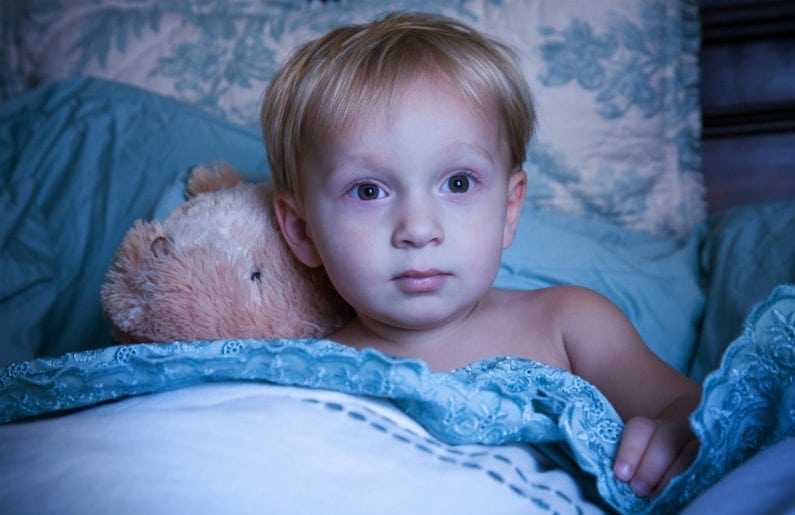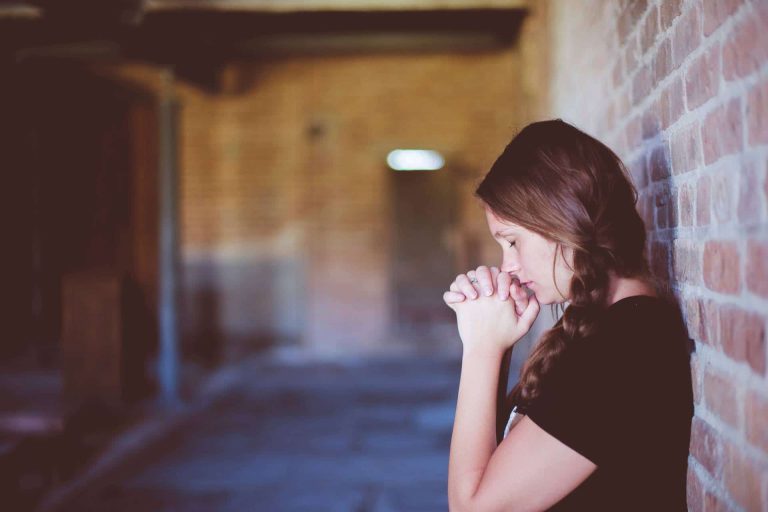Christian prayer to sleep children with insomnia problems
Children almost never have difficulty falling asleep. However, there are factors that could cause insomnia in them. Learn more about the subject in this Post and learn the Christian Prayer to sleep children with Insomnia problems.
Christian prayer to sleep children with insomnia problems
Our father!
Giver of life, forgiveness and justice.
Faithful Savior and vivifier of your creation.
Today I thank you for your mercy and trust.
Thank you for the trust you place in each mother by blessing
His life with a beautiful baby.
I want my child to rest, as expressed
your word in Psalm 8:
In peace I will lie down and I will sleep as well,
because only you, Jehovah, make us live confident”
Lord help my son to fall asleep,
Allow him to have a restful sleep,
A pleasant and good dream.
Send your angels to guard my home and also
My son’s room.
Thank you once again for your protection,
Your care, your coverage.
Thank you for freeing my baby from stressful situations
For love and mercy you renew your pact
With those who love you, that’s why I leave in your hands one of the things
Most precious of the treasure that you have given me, My son.
Cover it, save it and
may your perfect will be fulfilled in him.
In the name of Jesus, amen!
When to do it?
The Christian Prayer to sleep children with Insomnia problems can be freely performed at the time you decide and in the place that you think is best. You should try in any case that it is a quiet place, if your baby is very small it is recommended to do it while you have him in your arms or in the bed-cradle.
If it is an older child, you could sit him next to you and pray for him. On the contrary, if he is a child over 10 years old, with full understanding you can explain to him and in a way that he understands, invite him to pray with you. (See Article: Prayer of gratitude for health )
Who should do it?
This type of Prayers is recommended as a key and main piece to be executed by the Fathers in the foreground. Since they are considered an exclusive figure of the home and those who know their children best. It should be noted that the rest of the family can also do it, uncles, grandparents, their closest friends. In fact, everyone is requested to do so voluntarily and calmly.
Importance
The Christian Prayer to sleep children has been described as an effective tool of great benefit and blessing for believers. It is the direct, specific and creative way to connect with the Heavenly Father. In ancient times, many men described in the Bible agreed that there is no better method to strengthen the relationship with God than Prayer.
Through it we present to God each of the requests we have, not only for ourselves but also collectively for those around us who need it. The Christian Prayer to sleep children with Insomnia problems is of great importance when a mother decides to hand over control over her son to God.
It is important to ask for wisdom and provision for the children, also to solve the problems that could arise along the way.
insomnia in children
From before birth, the smallest of the home, have neurons equipped to function as a natural clock and the control of rest and attention is given by this organic clock, which allows the child to rest on specific occasions and be aware of other people.
In any case, the activity of this organic clock is also affected by the natural states of light darkness, so that in dim conditions, our brain secretes a hormone called melatonin, which stimulates rest, while this hormone is restricted by outer brightness.
From approximately the third month of life, you discover how to synchronize these two data, so that you can begin to coordinate the waking cycle with the day-night cycle.
A baby sleeps a total of 16 hours a day, in at least 6 to 8 rest scenes of 3 to 4 hours each, with scattered moments of attention. Therefore, the infant does not consider the night, waking up once or several times through it. (See Article: Night Prayer Psalm 4 )
From the prime month to age 3 1/2, the duration of nighttime awakenings decreases and he begins to rest consistently throughout the night. Be that as it may, in almost 33% of preschool children these nocturnal awakenings continue, as a result of an insufficient combination of the night rest period.
Somewhere in the range of 2 and 4 years of rest around the time of the afternoon, around 10 o’clock, in addition to the typical two naps. After three years of age, the “need” to rest during the day diminishes, until, for all intents and purposes, it disappears before the age of six.
Sleep behavior by age range
From 5 to 10 years, the fantasy reaches an adequate level of development to allow correlation with the adult. Despite the fact that there are significant individual variations, the number of long rest periods is typically 2.5 times that of the adult, and the length of remaining sleep is similar to that of the adult.
After 7 years, it is not normal for the young person to need to rest. If it happens, it is almost certain that during the night he will not have what he needs or will experience the negative effects of a problem during the rest of the night.
Starting in youth, the amount of long rest periods will decrease to an average of 7 to 8 hours, which could be deficient since there is an expansion in daytime rest, which has led to the idea that absolute rest needs they do not decrease yet but increase during adulthood.
Rest needs differ significantly, there is no homogeneous rest design, and what one child needs may not be relevant to another. In any case, in the event that it is difficult for you to fall asleep normally or stay awake at night or in the event that you are tired during the day, you must associate the presence with a rest problem or with the propensities that lead to it’s.
As in adults, children may have trouble starting or taking care of sleep, despite the fact that they rarely complain of this problem and are usually content to remain alert.
The onset of rest requires an amazing coordination of natural conditions and learned practices: on the one hand, the life form must be physiologically ready for rest. On the other hand, the practices that we carry out in the moments prior to rest end up becoming habits that promote rest that, when absent, prevent us from sleeping.
Commitment ceremonies are also vital for children, and often their problem is a sleep disorder that is not due to waking up during the night, but not having the option to go back to sleep, in light of the fact that the increases are related to the beginning. of rest are absent in the middle of the night when they wake up.
Stress
Due to sporadic schedules, over-acting, family problems, youthful fears, or divisive tension, children need daily practice to create because it gives them security. At the time that this security is altered, young people respond by showing their tension through crying, making changes and protecting themselves so as not to fall asleep at night.
They follow similarly when, after an energizing day, they are advised to rest, as falling asleep is an adjustment in movement from which they are receiving a charge. In some cases, the problem may arise from the presence of unnecessarily unpredictable family plans.
Another continuous reason for the challenges to start the fantasy, is the recognition of long sleeps towards the night, therefore, with a problem, a sleep disorder, one of the main measures to consider is the reduction or even the concealment of rest. day.
Recommendations when sleeping children
It is necessary that you take into consideration each of these recommendations and that you monitor your child promptly at the time corresponding to sleep. This is when parents have great participation:
- A baby must rest 16 hours every day, while with a year only 14 without distinction
- The most important rule to get the child to rest at the perfect time is to make a fantasy routine for him. How? The first step is to find out what the ideal opportunity to rest should be.
- A baby needs to rest 16 hours a day. As the youngster develops, he decreases, as indicated by the movement that accompanies him: 15 hours every day to the quarter of a year of life; 14 hours per year of age; 13 hours at two years; 11 hours to five; ten to nine years of age; nine hours at 14 years of age; And eight hours from the most part period. So it has been established.
- To make a rest program, the subsequent stage is to develop a progression of exercises that will each be done again, before the night’s rest. It could be giving you a shower, offering you a pitcher of milk, brushing your teeth, or reading a story at your organization. The formation of a ceremonial helps to make propensity and to have the opportunity to rest.
- Sending the boy to bed as a method of discipline is a regular mix-up. Dr. Rocío Sánchez-Carpintero records a progression of “rest cleaning” measures that help young people to sleep when they need it, in her article distributed within the Nervous System Science Protocols of the Spanish Association of Pediatrics .
- In this sense, the professional says: “It is essential to prevent the boy from associating the bed with a disciplinary circumstance.”
- As this indicates, it is a mistake to put the boy to rest for having misbehaved. In any case, it is appropriate for the son to invest energy in his room during the day, so that he does not connect it with the unsatisfactory snapshot of rest.
- Making a rest routine in the child suggests that the time of sleep should be the equivalent, but also the time of getting up. Having fixed schedules will make it easier for the baby to recognize the decisive break in the schedule.
- Occasions like Christmas, Easter, summer can absolutely disturb this restful musicality. In the event that during the long break periods, the children who go to class have changed their constant schedules and can get up later, it is appropriate that in the days before the start of classes they progressively familiarize themselves.
- So that there are no problems when sleeping, it is better that the children touch the base at that moment exhausted and loose. Subsequently, it is great that during the day the physical action is constant. Children have a lot of vitality and are eager to spend it. It is significant that they play outside, run, swim or another game.
- In order for the young person to relax, it is imperative to maintain a strategic distance from exercises that can give him energy during that last part of the day, including computer games and watching television.
- On the other hand, reading a story as the last action of the day, before turning off the light and giving the child a chance to stay alone in bed, adds to the child’s relaxation.
- The level of turbidity in the room is equally significant. In this way, when the room has an exterior window, it must be closed firmly by methods for people with visual problems.
- On the other hand, it might be advantageous to leave some light inside the room, to avoid the fear of being separated from everyone else in the room. This light will also come in handy so you won’t be terrified if your little one wakes up in the middle of the night. (See Article: Prayer request to God )
- Nutrition also affects the nature of children’s rest. There are nutrients that energize the boy, so they will make him progressively confused to go to bed at the time you need. In this regard, it is imperative to get rid of drinks with a high sugar content, as well as caffeine, at night followed by doing the Christian prayer to sleep children with insomnia.

Hello! Let me enthusiastically introduce myself as a dedicated blogger fueled by an intense passion for meticulously crafting insightful and well-researched blogs. My mission revolves around providing you, dear readers, with a veritable treasure trove of invaluable information.







